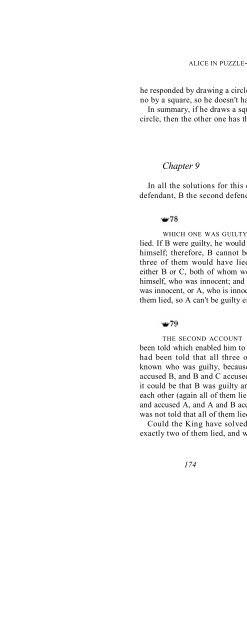Which Alice?
Which Alice? Which Alice?
ALICE IN PUZZLE-LAND he responded by drawing a circle, then he means yes by a circle and no by a square, so he doesn't have the prize. In summary, if he draws a square, he has the prize; if he draws a circle, then the other one has the prize. Chapter 9 In all the solutions for this chapter we shall let A be the first defendant, B the second defendant, and C the third defendant. WHICH ONE WAS GUILTY? We are given that the guilty one lied. If B were guilty, he would have told the truth when he accused himself; therefore, B cannot be guilty. If A were guilty, then all three of them would have lied (because A would have accused either B or C, both of whom were innocent; B would have accused himself, who was innocent; and C would have accused either C, who was innocent, or A, who is innocent). But we are given that not all of them lied, so A can't be guilty either. So C was guilty. THE SECOND ACCOUNT What could the White King have been told which enabled him to know who the guilty one was? If he had been told that all three of them lied, he could never have known who was guilty, because it could be that A was guilty and accused B, and B and C accused each other (so all of them lied); or it could be that B was guilty and accused C, and A and C accused each other (again all of them lied); or again it could be C was guilty and accused A, and A and B accused each other. So the White King was not told that all of them lied. Could the King have solved the case if he had been told that exactly two of them lied, and which two they were? No: Suppose, 174
- Page 318: ALICE IN PUZZLE-LAND the Gryphon) m
- Page 322: ALICE IN PUZZLE-LAND mad means that
- Page 326: ALICE IN PUZZLE-LAND ten tarts. Now
- Page 330: ALICE IN PUZZLE-LAND the same as it
- Page 334: ALICE IN PUZZLE-LAND WHO IS OLDER?
- Page 338: ALICE IN PUZZLE-LAND WHO IS MURDOCH
- Page 342: ALICE IN PUZZLE-LAND that A told th
- Page 346: ALICE IN PUZZLE-LAND is not a spy;
- Page 350: ALICE IN PUZZLE-LAND both possibili
- Page 354: ALICE IN PUZZLE-LAND ANOTHER DIVISI
- Page 358: ALICE IN PUZZLE-LAND that if we mul
- Page 362: ALICE IN PUZZLE-LAND since his stat
- Page 366: ALICE IN PUZZLE-LAND and the other
- Page 372: Solutions to the Puzzles for exampl
- Page 376: Solutions to the Puzzles ANOTHER CA
- Page 380: Solutions to the Puzzles so if the
- Page 384: Solutions to the Puzzles two possib
ALICE IN PUZZLE-LAND<br />
he responded by drawing a circle, then he means yes by a circle and<br />
no by a square, so he doesn't have the prize.<br />
In summary, if he draws a square, he has the prize; if he draws a<br />
circle, then the other one has the prize.<br />
Chapter 9<br />
In all the solutions for this chapter we shall let A be the first<br />
defendant, B the second defendant, and C the third defendant.<br />
WHICH ONE WAS GUILTY? We are given that the guilty one<br />
lied. If B were guilty, he would have told the truth when he accused<br />
himself; therefore, B cannot be guilty. If A were guilty, then all<br />
three of them would have lied (because A would have accused<br />
either B or C, both of whom were innocent; B would have accused<br />
himself, who was innocent; and C would have accused either C, who<br />
was innocent, or A, who is innocent). But we are given that not all of<br />
them lied, so A can't be guilty either. So C was guilty.<br />
THE SECOND ACCOUNT What could the White King have<br />
been told which enabled him to know who the guilty one was? If he<br />
had been told that all three of them lied, he could never have<br />
known who was guilty, because it could be that A was guilty and<br />
accused B, and B and C accused each other (so all of them lied); or<br />
it could be that B was guilty and accused C, and A and C accused<br />
each other (again all of them lied); or again it could be C was guilty<br />
and accused A, and A and B accused each other. So the White King<br />
was not told that all of them lied.<br />
Could the King have solved the case if he had been told that<br />
exactly two of them lied, and which two they were? No: Suppose,<br />
174



